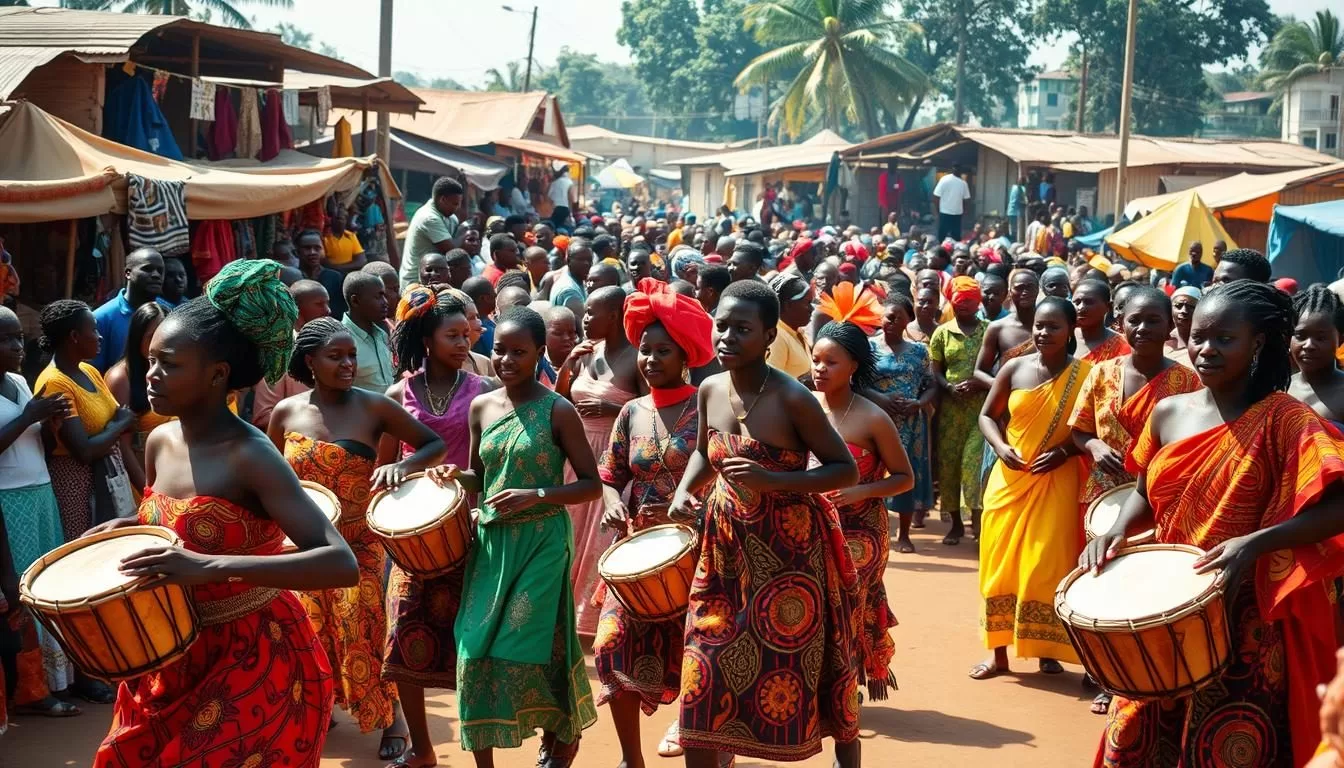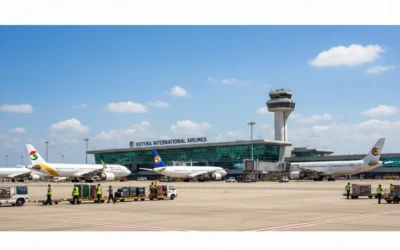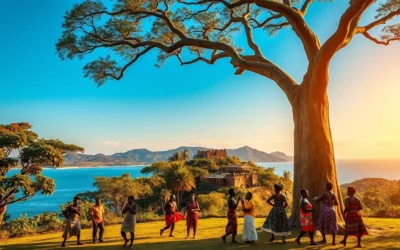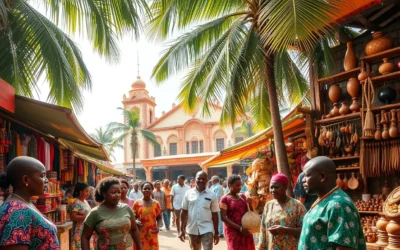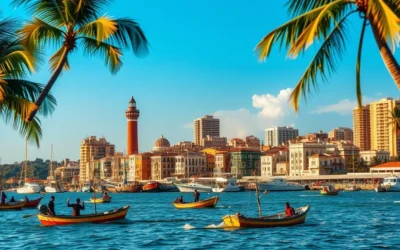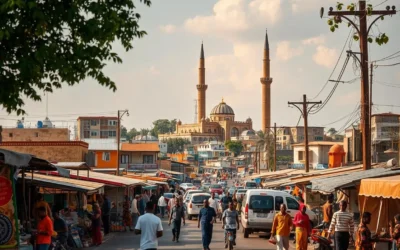✓ Accommodations✓ Flights✓ Rental Cars✓ Tours & Activities
When planning your next adventure to West Africa, you should consider experiencing the vibrant festivals that Ghana has to offer. These events are a notable feature of Ghanaian society, showcasing the country’s rich cultural heritage and traditional practices.
Attending a festival in Ghana can be a life-changing experience. You’ll have the opportunity to immerse yourself in local traditions, witness colorful celebrations, and connect with the community. With numerous festivals taking place throughout the year, you’re likely to encounter one during your trip. By timing your visit to coincide with these events, you’ll gain a deeper understanding of the country’s history and contemporary society.
This guide will provide you with an overview of the top festivals to check out, helping you make the most of your time in this culturally rich country.
Experience Ghana’s Rich Cultural Heritage Through Festivals
Ghana’s rich cultural heritage is best experienced through its vibrant festivals, which offer a glimpse into the country’s history, traditions, and values. You can plan your trip to Ghana around these festivals to get a deeper understanding of the local culture.
Why Festivals Are Essential to Ghanaian Culture
Festivals play a vital role in Ghanaian culture, serving as a means of preserving traditional practices, promoting community bonding, and showcasing the country’s rich heritage. They are an integral part of the Ghanaian identity and are often tied to historical events, agricultural cycles, or religious observances. By participating in these festivals, you can gain a deeper understanding of the local customs and way of life.
Best Times of Year to Experience Festivals in Ghana
Ghana’s climate varies across regions, influencing the timing of its festivals. In the south, the dry season from November to March is ideal for attending festivals, while July and August offer another window of celebration. In the north, the dry season is from November to April, making it the best time to travel and experience the local festivals. You can plan your visit during these periods to make the most of your trip.
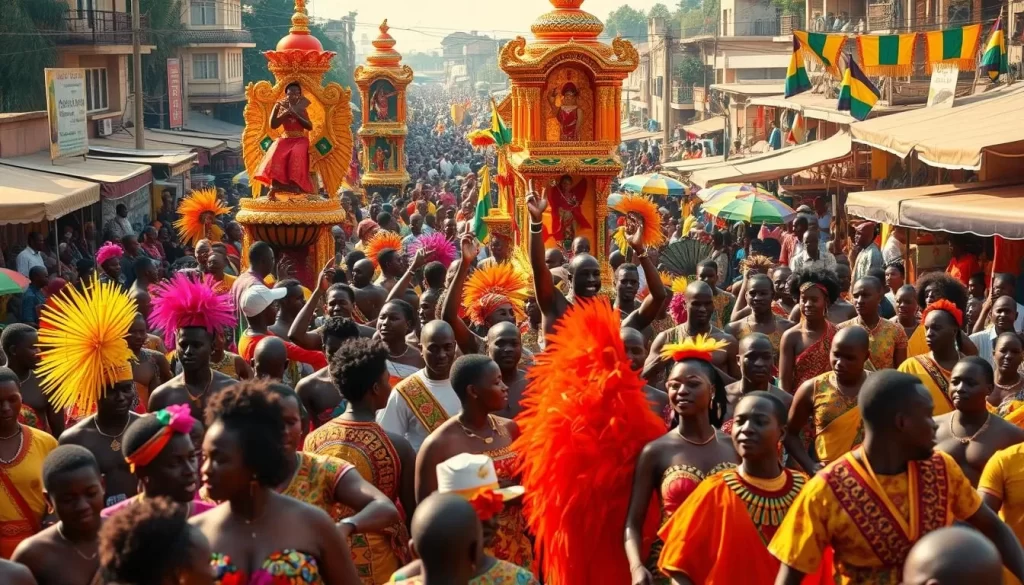
By understanding the festival calendar and its alignment with Ghana’s seasonal patterns, you can time your visit to coincide with the celebrations that interest you the most. Some festivals follow lunar calendars, making their exact dates variable from year to year, so it’s essential to plan ahead and research the specific festivals you want to attend.
Homowo Festival: Celebrating the Harvest Season
Experience the warmth and joy of Ghanaian culture at the Homowo Festival, a celebration that honors the harvest season. This significant event is a time when the Ga people come together to commemorate their rich cultural heritage.
Origins and Meaning of “Hooting at Hunger”
The term “Homowo” translates to “hooting at hunger,” symbolizing the mockery of hunger after a bountiful harvest. This celebration is deeply rooted in the Ga people’s history and culture, marking a period of feasting and joy.
When and Where to Experience Homowo
The Homowo Festival typically takes place in May, primarily in the Greater Accra Region, particularly in Ga communities. You can witness the vibrant activities and immerse yourself in the local culture during this time.
What to Expect: Traditional Foods and Activities
During the festival, you’ll be treated to a variety of traditional food dishes, including “kpokpoi,” a special meal made from steamed fermented corn meal and palm oil. The event is also characterized by energetic drumming and dancing, as well as the sprinkling of “kpokpoi” to symbolically feed the ancestors. You can expect a lively atmosphere filled with celebrations and community bonding.
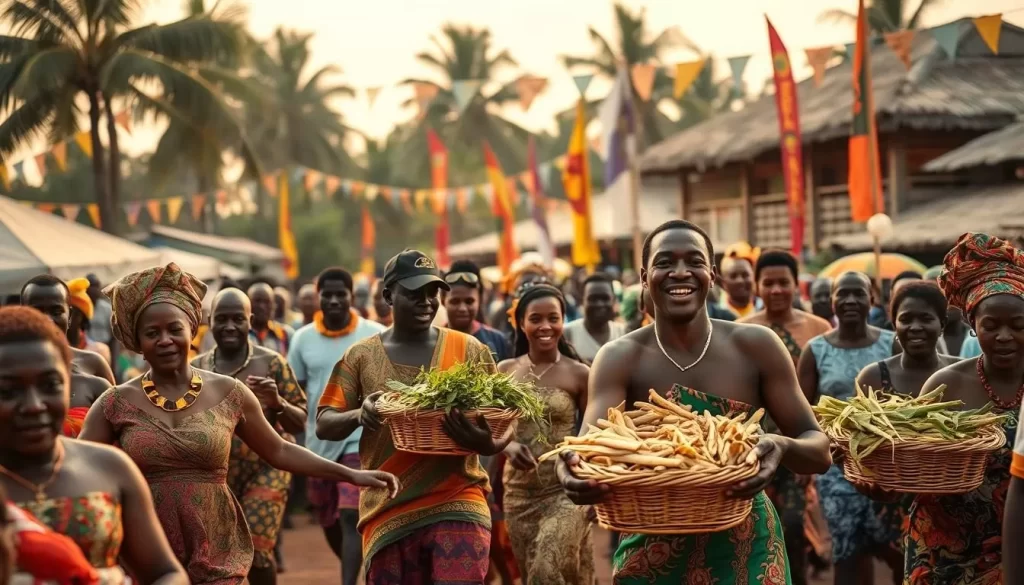
Aboakyer Festival: The Traditional Deer Hunt of Winneba
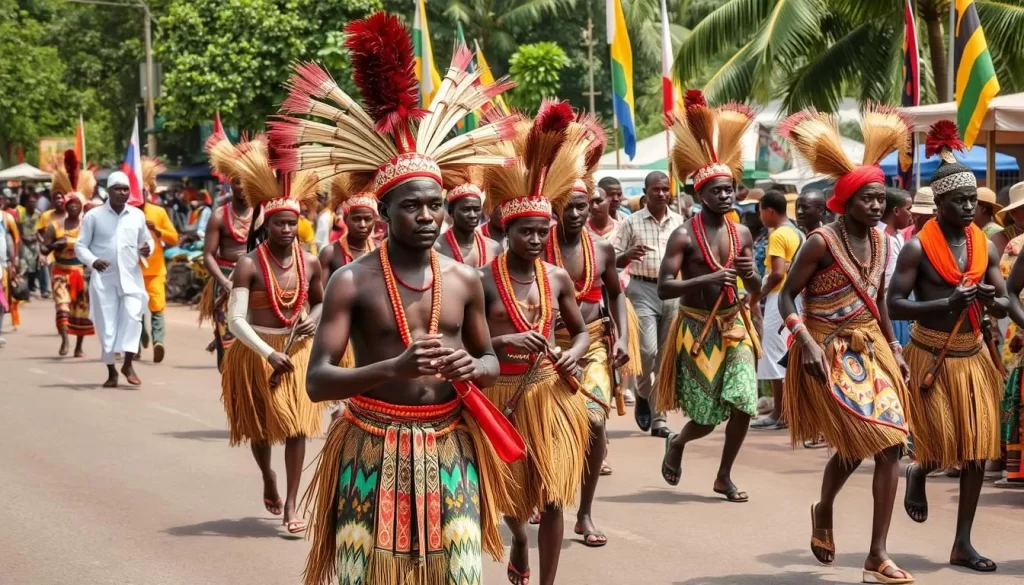
Join the adventure at the Aboakyer Festival, where the Effutu people celebrate their hunting traditions. This unique festival is a thrilling experience for travellers looking to immerse themselves in Ghanaian culture.
The 300-Year-Old Hunting Tradition
The Aboakyer Festival is a centuries-old tradition that showcases the Effutu people’s hunting prowess. It’s a celebration that has been passed down through generations, steeped in symbolism and ritual.
When and Where: First Weekend of May in Winneba
The Aboakyer Festival takes place on the first weekend of May in Winneba, Ghana. This is a great time to experience the vibrant culture of the Effutu people.
Highlights: The Antelope Hunt and Asafo Competitions
One of the highlights of the Aboakyer Festival is the “Aboakyer Chase,” a thrilling race where participants chase and capture a live antelope. The festival also features asafo competitions, showcasing traditional hunting techniques and martial abilities.
The festival includes several exciting activities, such as:
– Experiencing the pre-dawn gathering and rituals performed by the asafo companies.
– Witnessing the dramatic antelope hunt at daybreak.
– Enjoying the colorful processions and traditional war dances.
– Marveling at the skill demonstrations by asafo warriors.
Odwira Festival: Purification and Renewal in Ashanti Region
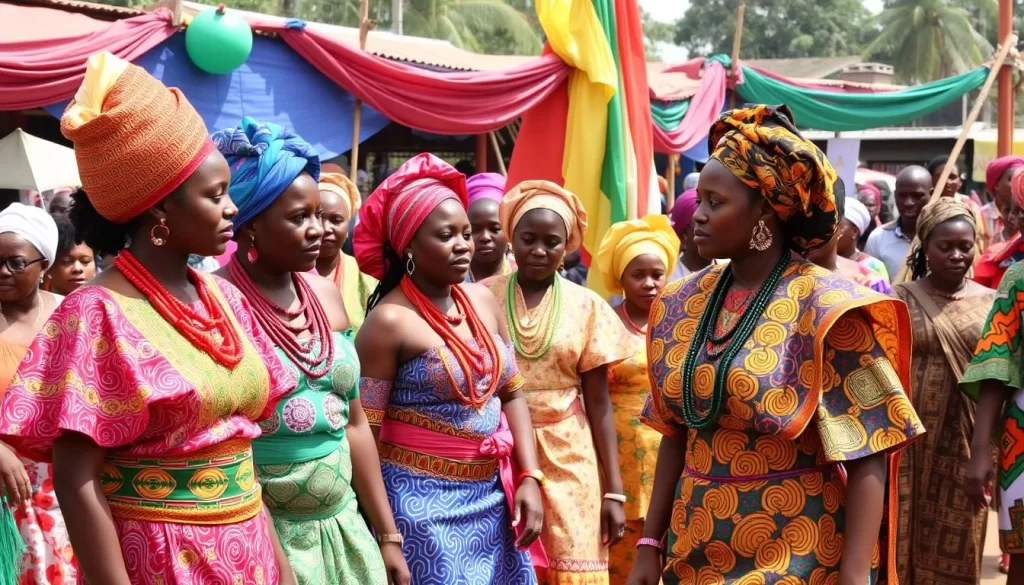
Ghana’s Ashanti region comes alive with the Odwira Festival, a celebration that embodies the spirit of purification and renewal. This significant event is a testament to the rich cultural heritage of the Ashanti people.
Cultural Significance and Royal Traditions
The Odwira Festival holds great cultural significance, showcasing royal traditions that have been preserved for centuries. It’s a time when the community comes together to honor their ancestors and renew their spiritual bonds.
When and Where: September Celebrations in Kumasi and Beyond
The Odwira Festival typically takes place in September, with the most significant celebrations happening in Kumasi, the heart of the Ashanti region. You can experience the vibrant culture and traditions of the Ashanti people during this time.
What to Experience: Processions, Dances, and Royal Court
During the Odwira Festival, you can witness traditional activities such as the purification ceremony, traditional dances, and processions. You can also experience the grand durbar, where the Asantehene and sub-chiefs appear in full regalia. The celebrations last for several days, offering a unique opportunity to experience the rich cultural heritage of the Ashanti region.
Some highlights of the festival include:
- Witness the spectacular grand durbar where the Asantehene and sub-chiefs appear in full regalia.
- Experience the powerful traditional drumming and dancing performances.
- Observe the sacred ritual of “feeding the stools” when libations and food offerings are presented to the ancestral spirits.
- Join the crowds lining the streets for the colorful processions.
- Marvel at the display of Kente cloth and other traditional textiles worn during the ceremony.
- Participate in the community feasting and social gatherings that form an important part of the week-long celebrations.
Damba Festival: Northern Ghana’s Islamic Celebration

In the heart of Northern Ghana, the Damba Festival unfolds as a mesmerizing celebration of Islamic traditions and cultural heritage. This significant event is a must-experience when visiting Tamale and the Northern Region.
Origins and Religious Significance
The Damba Festival has its roots in Islamic traditions and is celebrated with great fervor. It is a time for spiritual reflection and connection with the community.
When and Where: July-August in Tamale and Northern Region
The festival takes place in July or August, depending on the Islamic calendar. Tamale, the capital of the Northern Region, is the epicenter of the celebrations.
Cultural Highlights: Prayers, Dances, and Traditional Foods
During the festival, you’ll witness traditional activities like Islamic prayers, dances, and processions. You can also indulge in local cuisine, such as tuwo (a corn or millet dough) and bofrot (a type of doughnut). Experience the rhythmic Damba dance, featuring dramatic movements that tell stories of bravery and cultural identity. You can also taste authentic northern Ghanaian cuisine like tuo zaafi (TZ) and jollof rice with guinea fowl, and join in the community atmosphere as families open their home to visitors, offering food and hospitality. This is truly an adventure into the heart of Ghanaian culture.
Kente Festival: Celebrating Ghana’s Iconic Textile Art
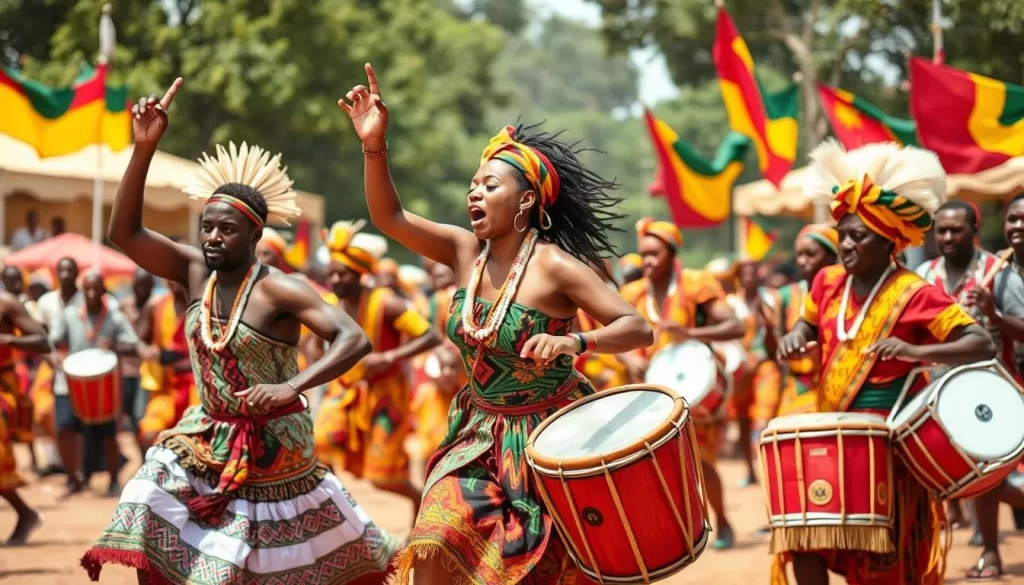
Immerse yourself in Ghana’s cultural richness at the Kente Festival, where tradition meets contemporary flair. The Kente Festival is a unique opportunity to witness the beauty and significance of Ghana’s iconic textile art.
The Cultural Importance of Kente Cloth
Kente cloth is more than just a textile in Ghanaian culture; it symbolizes wealth, status, and cultural heritage. The intricate patterns and designs convey messages and tell stories that are passed down through generations.
When and Where: April in Bonwire
The Kente Festival takes place in April in the town of Bonwire, which is renowned for its Kente weaving tradition. On the day of the festival, the streets come alive with vibrant displays of culture.
What to See: Weaving Demonstrations and Fashion Shows
During the festival, you can witness master weavers demonstrating their craft on traditional narrow looms, creating intricate geometric patterns that make Kente famous worldwide. The festival also features a spectacular Kente fashion show, where models showcase the latest designs and styles, adorned with colorful beads. You will have the opportunity to see both traditional and contemporary applications of Kente cloth, highlighting its versatility. Moreover, you can gain insight into the weaving process, from spinning and dyeing threads to the final assembly of the cloth.
The festival offers a range of activities, including:
- Witnessing master weavers at work
- Experiencing the Kente fashion show
- Observing the ceremonial presentation of newly woven Kente cloths
- Learning about the symbolism behind different Kente patterns
- Shopping for authentic Kente directly from weavers
- Marveling at historic Kente pieces from family collections
Ghana: Top Festivals to Check Out When Visiting Based on Season
Ghana is a country that comes alive with festivals, each offering a unique glimpse into its rich cultural tapestry. Whether you’re visiting during the dry or rainy season, there’s always a vibrant celebration to experience.
Dry Season Festivals (November-March)
During the dry season, Ghana hosts several significant festivals. The dry and relatively cooler weather makes it an ideal time for outdoor events. One notable celebration is the Paragliding Festival, part of the Kwahu Easter festivities, attracting both locals and tourists with its aerial displays and music. This period is perfect for travelers who prefer milder weather and more outdoor activities.
Rainy Season Festivals (April-October)
The rainy season brings its own set of unique festivals. You can experience the Aboakyer Festival in early May, a traditional deer hunt competition between the asafo companies of Winneba. Later in the year, the Bakatue Festival in Elmina celebrates the beginning of the fishing season with ancient rituals and processions. Additionally, the Homowo Festival in August and the Fetu Afahye Festival in September offer insights into Ghana’s cultural heritage, with traditional foods, dances, and regalia.
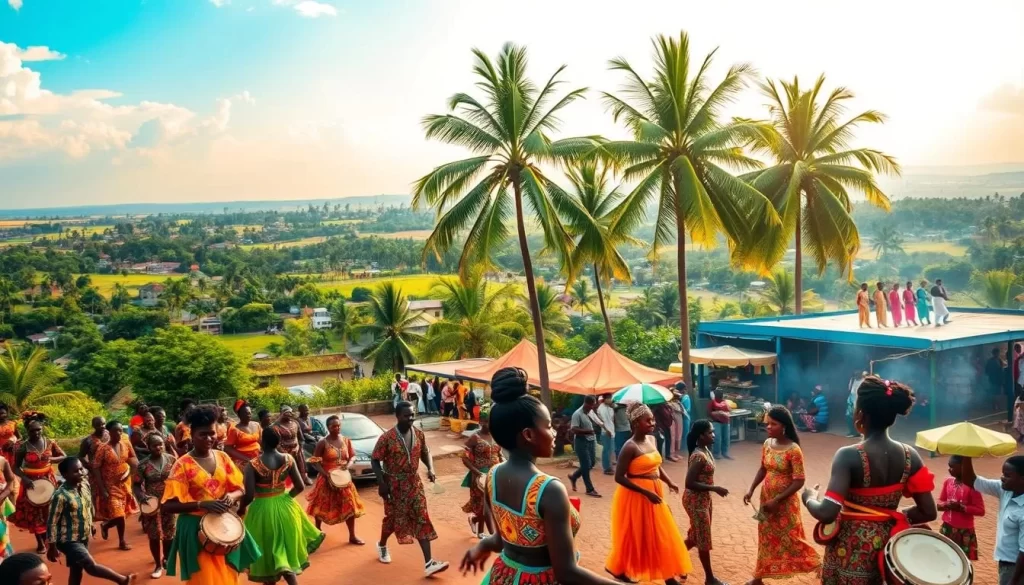
Traveling during the rainy season has its advantages, including fewer tourist crowds and a more immersive cultural experience. However, it’s essential to be prepared for the challenges that come with rainy season travel, such as difficult road conditions and the need for flexible itineraries.
Lesser-Known but Spectacular Festivals Worth Experiencing
For those looking to explore beyond the usual tourist attractions, Ghana’s lesser-known festivals provide a unique cultural insight into the country’s rich heritage. These events offer an opportunity to experience the authentic traditions and customs of the Ghanaian people.
Hogbetsotso: The Exodus Festival of the Ewe People
The Hogbetsotso festival is a significant event for the Ewe people, commemorating their migration from Notsie to their current home in Ghana. It’s a celebration that showcases their history and cultural identity.
Bakatue: Elmina’s Ancient Fishing Festival
Bakatue is an annual festival held in Elmina, celebrating the town’s fishing traditions. The event includes rituals to purify the fishing community and ensure a bountiful harvest.
Fetu Afahye: Cape Coast’s Colorful September Celebration
Fetu Afahye is a vibrant celebration held in Cape Coast, marking the town’s founding and the beginning of the harvest season. It’s characterized by colorful processions, traditional dances, and the display of regalia by local chiefs.
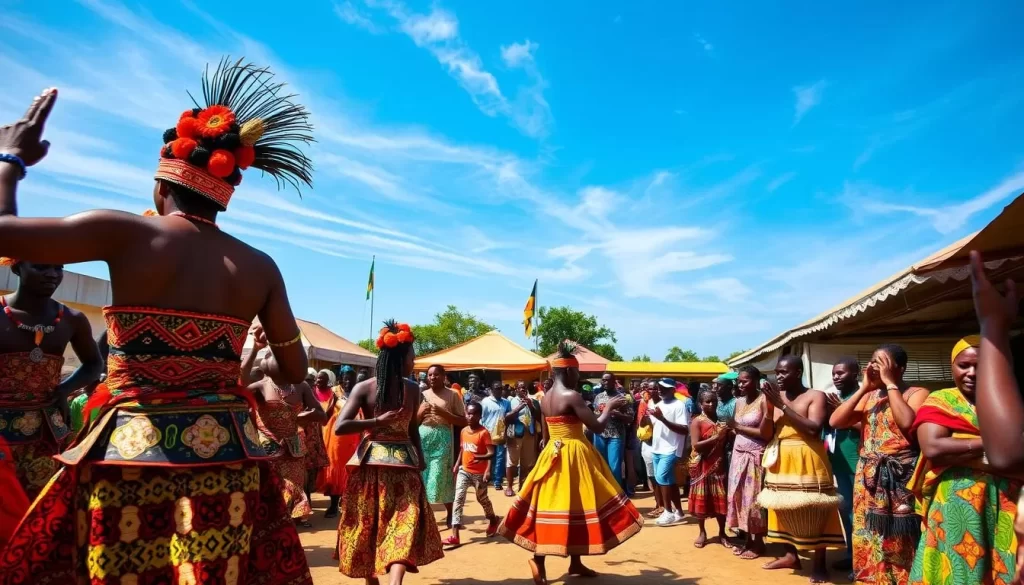
Practical Tips for Festival-Goers in Ghana
To make the most of your adventure in Ghana, consider aligning your travel dates with one of the many festivals that take place throughout the year. Planning your trip well in advance is crucial, as accommodation in festival areas can become scarce and expensive.
When attending a festival, pack modest attire for religious events and comfortable clothing for outdoor celebrations. Bring cash in small denominations, as not all vendors accept credit cards. Consider hiring a local guide to provide cultural context and navigate festival protocols.
Stay hydrated and protected from the sun, and be respectful of photography rules. Learning a few basic phrases in the local language can enhance your experience. Be flexible with your itinerary, and don’t hesitate to participate in festival activities when invited.
The above is subject to change.
Check back often to TRAVEL.COM for the latest travel tips and deals.
